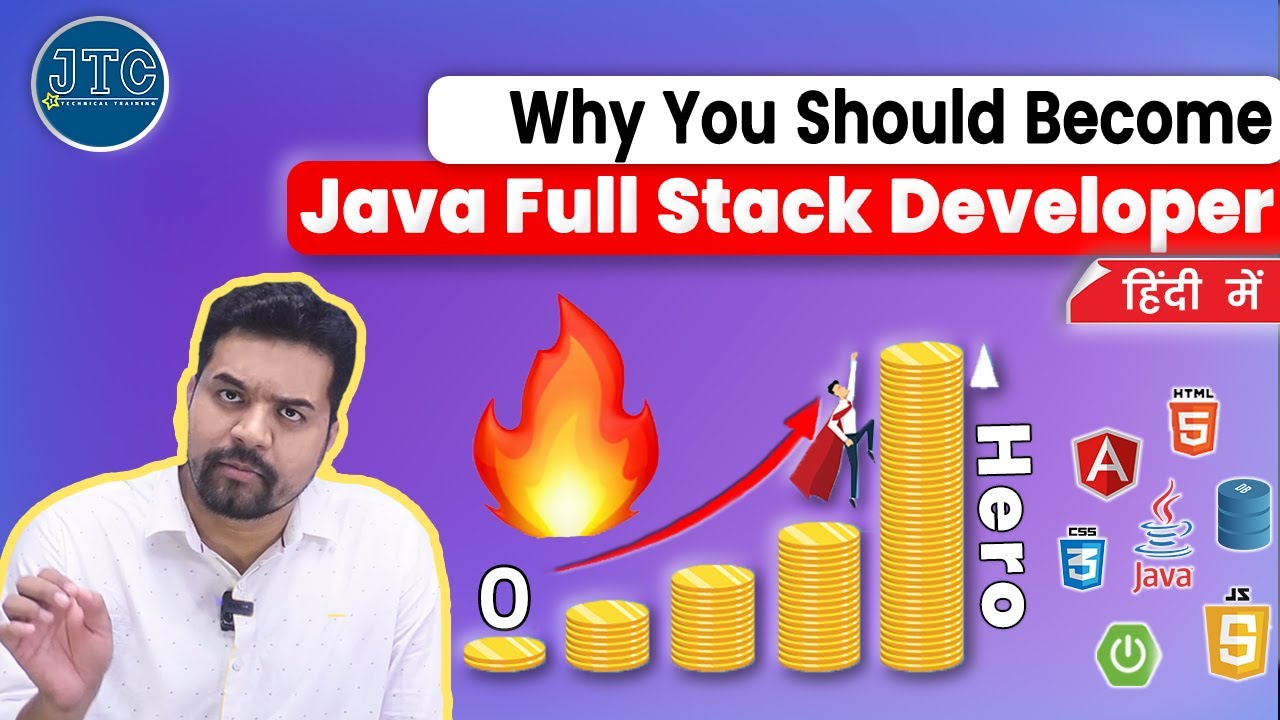Course Overview
The Java Full Stack Developer Course offered by JTC provides comprehensive training in Java programming language, along with front-end and back-end web development frameworks like Angular, Spring, and Hibernate. The course covers essential topics like database management, RESTful APIs, and DevOps tools. Students also gain hands-on experience by working on real-world projects and get certified upon completion.
Join This Course

Student from any stream can join and become a certified Java Professional

Java Full Stack certification valued by all sectors

Assured placement with high salary package and career growth
Course Curriculum
Java Basic
Introduction of Program
Introduction of Programming Language
Introduction of Java
Installation and Classpath setting
Important terminology
Java Language
Character Set | Keyword | Identifiers
Data Types
Variable
Literals
Operator
Control Statement
Array
OOPS
Introduction of OOPS
Class | Object | Class Loaders & Class Loading Concept
Instance & Static Variable
Block
Method
Constructor
Abstraction
Encapsulation
Inheritance
Polymorphism
Abstract Class
Interface
Inner Class
Package
Introduction of Package
Package configuration
import
Jar files
Access Modifier
java.lang package
Introduction of java.lang package
java.lang.Object class
Garbage Collection
Cloning
java.lang.String class
java.lang.StringBuffer class
java.lang.StringBuilder class
java.lang.System class
java.lang.Runtime class
Wrapper Class
Exception Handling
Introduction of Exception
Different types of Exceptions
Try-Catch & Finally block
throw & throws keyword.
Autoclosable Interface
Multi-threading
Introduction of Multi-threading.
Thread Priority
User-Define Thread
Thread Life-Cycle
Dead lock
Synchronization
Inter-Thread Communication
Collction Framework
Introduction of Collcetion Framework
List
Set
Map
Queue
Iterator, List-Iterator & Enumeration
Generics
Introduction of Generics
Generics Classes
Bounded Types
Generics Methods & Wild-Card characters
IO Package
Introduction
Stream
Filtering
Storing Data records
Readers
Writers
Files
Introduction
File Classes
Untility Methods and Constructor
Action Methods
Object Serialization
Introduction of Serialization
Reading an object from a files
Custom Serialization
Externalizable
Serial Varsion UID
Scanner Class
Introduction of Scanner Class
Utility Methods & Constructors.
Annotation
Introduction of Java Annotation
Types of Annotation
Built-In Annotation
JDBC
Introduction of JDBC
JDBC Drivers
JDBC Statements
Batch Updates
Result Set
Row Set
Servlet
Introduction of Servlet
Introduction of Servlet
Web Server | Web Client | Web Container | Http & Https | TCP & IP | DNS
Web Server setup
Servlet API
Servlet Example using Web.xml
Servlet Example using Annotations
Servlet Life Cycle
Servlet Parameters
Request Dispatcher
Servlet Thread Models
HttpServletRequest & HttpServletResponse.
Session Management
Exploring HttpSession
Servlet Scopes
Servlet Filter & Filter Chaining
Listeners
JSP
Introduction of JSP
JSP Life-Cycle & JSP Life-Cycle Methods
JSP Implecit Objects
JSP Scripting formats
JSP Directives
JSP Standard Actions
JSP Scopes
JSP EL Expression
JSTL Tags
Custom Tags
Hibernate
Introduction of Hibernate
Difference between JDBC and Hibernate
Hibernate Features
First Example of Hibernate using hbm.xml file
First Example of Hibernate using annotations
Hibernate Inheritance Mapping
Table Per Class Mapping
Table Per Concrete Class mapping
Association Mapping
One-to-One Uni-directional Mapping
One-to-One Bi-directional Mapping
Many-to-Many Mapping
Version Mapping
Timestamp Mapping
Hibernate Example on DAO Pattern
Hibernate Query Language SQL | HQL | QBC | Native Query | Named Query
Polymorphic Query
Positional Parameters & Named Parameters
Simple Primary Key
Custom Primary Key
Composite Primary Key
Introduction of Transaction Management
ACID Property
Transaction Concurrency Problem & Solutions
Types of Transactions.
Hibernate Connection Management
JDBC Transaction
JTA Transaction
CMT Transaction
Hibernate Architecture
Exploring SessionFactory
Object States
Introduction of Hibernate Cache
Different types of Hibernate Cache
Hibernate Cache Architecture
JSP
About Spring 5.x Training
Spring 5.x Course Prerequisite
Spring 5.x Training Course Objective
Spring 5.x Training Course Duration
Spring 5.x Training Overview
Spring Introduction
Spring Core Module
Spring Core Module with Annotations
Spring Core Module with 100% Code/Java Config Approach.
Spring Boot Core
Spring JDBC/DAO
Spring AOP Module
Spring Transaction Management
Spring MVC
Spring Security
Spring ORM
Spring Data and Spring Data JPA
Spring Batch
Spring Mail
Introduction to Spring MicroServices
How to Explain Project Architectures
Spring Boot
Spring Boot introduction
Spring boot - Bootstrapping
Spring boot - Tomcat Development
Spring boot - Build System
Spring boot - Code Structure
Spring boot - Spring beans and dependency injection
Spring boot - Runners
Spring boot - Application Properties
Spring boot - Logging
Spring boot - Building Restful Web Service
Spring boot - Exception Handling
Spring boot - Interceptor
Spring boot - Servlet Filter
Spring boot - Rest Template
Spring boot - File Handling
Spring boot - Service Components
Spring boot - Consuming Restful Web Services
Spring boot - Cors Support
Spring boot - Internationalization
Spring boot - Scheduling
Spring boot - Enabling Https
Spring boot - Eureka Server
Spring boot - Service Registration With Eureka
Spring boot - Cloud Configuration Server
Spring boot - Cloud Configuration Client
Spring boot - Actuator
Spring boot - Admin Server
Spring boot - Admin Client
Spring boot - Enable Swagger2
Spring boot - Creating Docker Image
Spring boot - Tracing Micro Service Logs
Spring boot - Flying Database
Spring boot - Web Socket
Spring boot - Batch Service
Spring boot - Spring for Apache Kafka
Spring boot - Database handling
Spring boot - Securing Web Application
Spring boot - OAuth2 with JWT









